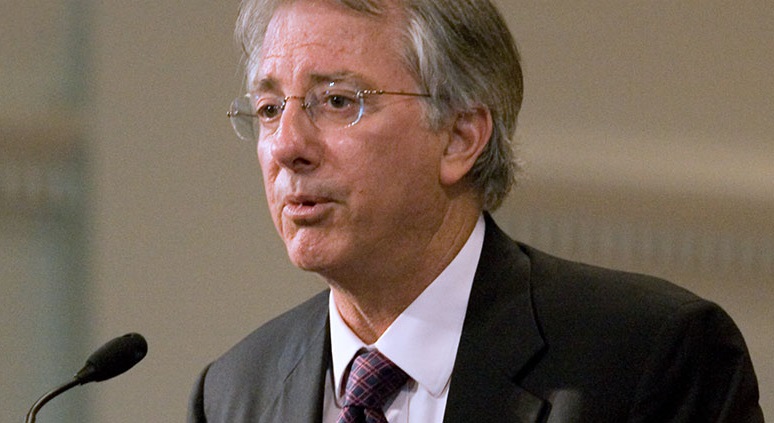[Special Note: The ADC has been unwilling to permit any recording of the oration to be made available to the public. In our opinion at JMedia, where our aim is to inform our community of important events that take place in Australia, this is a regressive move that is not in the public interest.
Furthermore because of the wish I have expressed to Dr. Dvir Abramovich to make a recording of Dennis Ross’ speech available for the benefit of the community he has decided to unfriend me on FaceBook. I feel that this is an extremely unctuous move that is unproductive and unconstructive. I believe this action by him may be as a result of an email I wrote straight after the event expressing my concerns that a video presentation preceding Dennis Ross’ talk about the ADC’s work in fighting racism totally ignores the elephant in the room, namely the growing threat from Islamic anti-semitism worldwide.]
At this year’s ADC Gandel Oration Ambassador Dennis Ross spoke on the topic of Doomed to Succeed: Defeating anti-Semitism and Building Peace in the 21stCentury but there was very little in his talk about dealing with anti-semitism with the talk ostensibly being a discussion on the position of Israel in the world today looking at the positives and the negatives or the good news and the bad news for Israel’s position in the Middle East as Dennis Ross explained.
Nonetheless the audience was very receptive, an audience largely of Jews from the Melbourne community. Despite the assertions that the event was booked out one could see many empty spaces in the reserved section of the St.Kilda Town Hall.
Following a presentation by John Gandel, extolling the considerable achievements of Dennis Ross, the microphone was passed to Dennis Ross. The good news came first and these were the good news items that Ross provided:
- There has been a change in tone from the Obama to the Trump administration and the staff that Trump has assembled around him is sympathetic towards Israel, in particular Nikki Haley, the US Ambassador to the UN who has focussed on making the bias against Israel a persistent theme of hers. Ross mentioned how the delegitimization of the religious core of Judaism by bodies like UNESCO denies the fundamentals of the Jewish faith and demonstrates a particularly heinous form of anti-semitism. When the Syrian regime used chemical weapons, the US retaliated, indicating it would not allow such a transgression to go unpunished, which sits in stark contrast to the weaker, veiled threats that were made under Obama.
- Israel has an improving relationship with the Sunni Arab leaders with a convergence of common interests, sharing the same threat perceptions and wanting to co-operate especially in the area of security. The Arab countries have doubts about the continuing involvement of the US in their region but on the other hand Israel is always there.
- Israel has become an exporter of energy which has positive geo-political ramifications, especially as Jordan is one of the beneficiaries.
- There is an expanding relationship with India in many areas.
- Outreach program with many African states with strong economic and diplomatic prospects.
- High level of Chinese investment in Israeli businesses.
- Clearly defined relationship with Russia who have not stood in Israel’s way when it has seen the need to stop arms shipments fuelling Hezbollah
Ross then embarked on the bad news items as follows:
- The relationships with China and Russia are narrow and don’t extend into the political and diplomatic realm. These two countries will always vote against Israel in every international forum.
- The expansion of Iranian hegemony in the region via Shia militias with tacit endorsement from Russia is bad for Israel. The US is focussed on ISIS and not dealing with what Iran is doing and consequently there are potential instabilities in countries like Jordan that might unfold.
- The greater legitimacy of Jeremy Corbyn could detrimentally affect the UK’s relationship with Israel and furthermore other European countries have shown repeated tendencies to come down against Israel over the settlement issue. The growth of far-right political parties in Europe with the rise populism can only mean a recipe for anti-semitism, but there is also the advent of strong anti-Zionist sentiments coming from the far-left that frequently descend into anti-semitism and the hateful demonization of Israel.
Finally Ross outlined some of the uncertainties in the Israel equation:
- Reliance on the rule-based framework that has been followed by the US in past decades may be flaunted by the Trump administration. For example under Trump the US has dropped out of the Paris climate accords and pulled out of the TPP trade deal.
- Trump may not sustain a practical focus on the peace issue when he finds, like those before him, how difficult it is to broker a peace agreement between the Israelis and the Palestinians.
- What will be the on-going role of the Arab countries to assist in striving to establish a basis for a peace deal between Israel and the Palestinians?
To finish Dennis Ross expressed a sense of optimism that with a constructive approach there is a good chance of a positive outcome for Israel in the region.
David Schulberg




